PENN STATE DICKINSON LAW PROFESSOR OF LAW KATHERINE C. PEARSON USES FULBRIGHT SCHOLAR AWARD FOR RESEARCH IN CANADA
March 2025 — In 2009, Penn State Dickinson Law Professor of Law and Arthur L. and Sandra S. Piccone Faculty Scholar Katherine C. Pearson experienced her first Fulbright Scholar Award at a program based at Queens University Belfast in Northern Ireland.
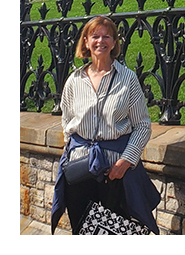 She loved her time working and living abroad, especially being in a capital city, but with a shorter time available to be away for residential research in 2024, she sought a Fulbright opportunity a bit closer to home. For her second award, Pearson applied to the Fulbright program in Canada, drawing on lessons from her earlier experience to shape her intentions and scholarship. She wanted to learn more about Canada’s approach to health care systems and aging issues.
She loved her time working and living abroad, especially being in a capital city, but with a shorter time available to be away for residential research in 2024, she sought a Fulbright opportunity a bit closer to home. For her second award, Pearson applied to the Fulbright program in Canada, drawing on lessons from her earlier experience to shape her intentions and scholarship. She wanted to learn more about Canada’s approach to health care systems and aging issues.
“I was looking to bring together several strands of my research. For the past 28 years, I have focused on access to justice for older adults and issues related to residential care, capacity, finance, and health care,” said Pearson. “I wanted to think about policy proposals for the future as they relate to those issues.”
She found that opportunity at the University of Ottawa in Ontario, where she served as Fulbright Canada Research Chair in Health Law, Policy and Ethics at the university’s Centre for Health Law, Policy and Ethics, residing in Canada from mid-September to the end of 2024.
Pearson conducted extensive research. She met with experts at Bruyère Health and Research Institute to discuss research directly related to dementia diagnosis and treatment and social care policies. She has begun collaboration on an article with Dr. Andrew Frank, a Bruyère neurologist who does frontline research in dementia care. She liaised with federal government officials at the Ministry of Labour and Seniors to discuss concerns about the exploitation of older adults and sat in on university and government meetings on a range of health-related subjects.
Her conversations and collaborations led Pearson to examine the possibilities offered by artificial intelligence (AI). She was intrigued by AI’s ability to gather and share health care-related information as well as its geo-location capabilities.
“Geo-location picks up things close to the user physically so that they could find out about, for example, alternatives for obtaining medicine, attaining counseling, or purchasing supportive medical equipment,” said Pearson. “Some of the apps even answered things such as, if these are your current symptoms, what should you do next?” She witnessed AI-supported apps for heart condition and cancer patients as well as apps designed to support individuals with Parkinson’s disease.
Pearson had many questions: How reliable can an AI program be? What are the risks associated with AI? How much would it cost? How could you put together a cohesive AI-based program?
She could not answer all those questions during a three-month residency, of course, but she has begun the first phase of work to develop AI navigation tools for older adults and their families that include law guidance. “The research and interviews have taken me to what I am going to do for the next year,” said Pearson. “Stimulating new projects, new collaborations, new thinking is what Fulbright opportunities do so well. The research support allows you the time and the grace to slow down, think deeply, and pull things together.”
Learning French and making new contacts
While the scholarship aspect of the Fulbright is critical, that is not the only reason to study abroad. Pearson also found joy and intellectual stimulation in her daily three-mile walk to work (she did not bring a car to Canada), weekend bike rides, and her biweekly French language class. She enrolled because she wanted to learn a foreign language in a foreign country. But the lessons gave her much more than a new way to say “hello.”
“By the end of my time in Canada, when I gave my presentation to the community in Ottawa as part of my Fulbright, my opening sentences were in French,” said Pearson. “My opening was brief and a bit ungrammatical, but starting that way seemed to score a few respect points. People knew I had not spoken French before I arrived in Canada and that I had learned to do this because I respected their traditions.”
Pearson forged connections with her fellow French class students (who still correspond via WhatsApp), Canadian colleagues, and others in the province’s capital city. One morning, she even ran into then-Premier Justin Trudeau, who was walking down the street some 10 feet away from her. “I thought, ‘This would never happen in the United States,’” said Pearson.
Some of her collaborations sparked opportunities for Pearson’s law students when she returned to the U.S. Earlier this semester, Professor Vanessa Gruben, director of the Centre for Health Law, Policy and Ethics, presented to Pearson’s “Conflict of Laws” class about gestational surrogacy contracts, sparked by the fact that Pearson learned during her Fulbright that up to 40% of couples who choose to make surrogacy arrangements in the Ontario province are American couples. She and Gruben are now discussing plans to offer a collaborative high-level policy seminar for law students at both universities in the fall.
Penn State ranks near top for Fulbright scholars
Penn State is one of the leading producers of Fulbright scholars among doctoral institutions in the country. It tied for second place during the 2024-25 academic year with 12 faculty members and 10 students receiving the awards, which are given by the U.S. Department of State’s Bureau of Educational and Cultural Affairs.
The Fulbright program began in 1946, and it has provided more than 400,000 people the chance to study abroad. “Fulbright is about creating new avenues for thinking,” said Pearson.
She also recently created something new at the Law School. Last year, she endowed the Professor Katherine Carroll Pearson Program Support Fund for Law and Aging Studies. It will provide Penn State Dickinson Law with funds to support programs and initiatives surrounding elder law and/or aging studies. Expenditures may include, but are not necessarily limited to, expenses related to elder law programming; support for adjunct faculty and lecturers with expertise in law and aging; Law School-hosted workshops, lectures, forums, and special events; and/or any clinical activities directed to legal services for older persons.
“I am getting closer and closer to retirement — although my family and friends still laugh when I say that — and I would like to see our Law School continue to have strong programming supporting older adults and their families. This is my way of giving back to our university in support of that goal,” said Pearson.
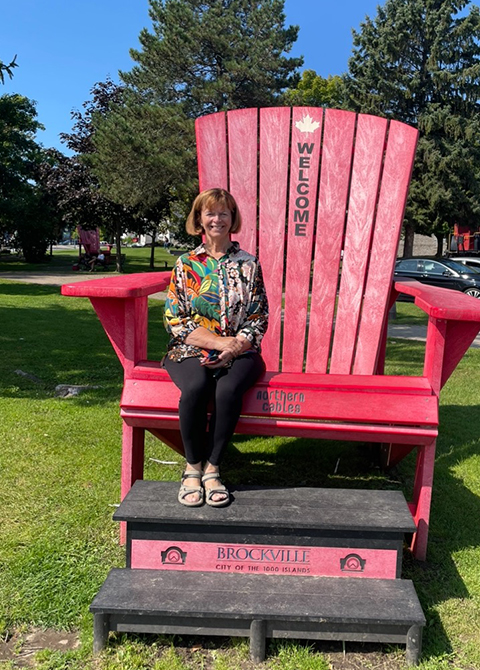
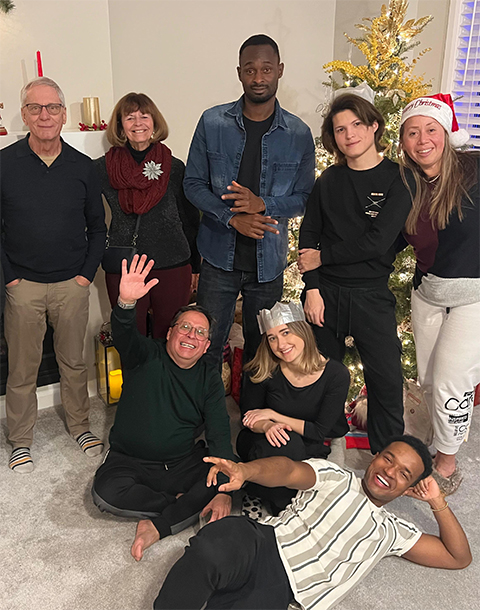
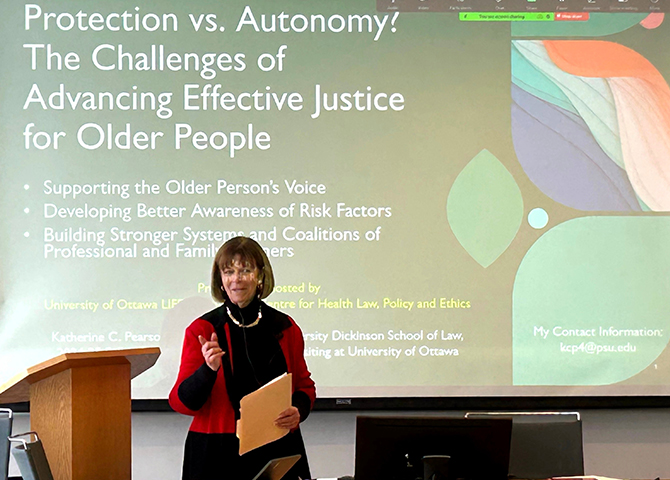
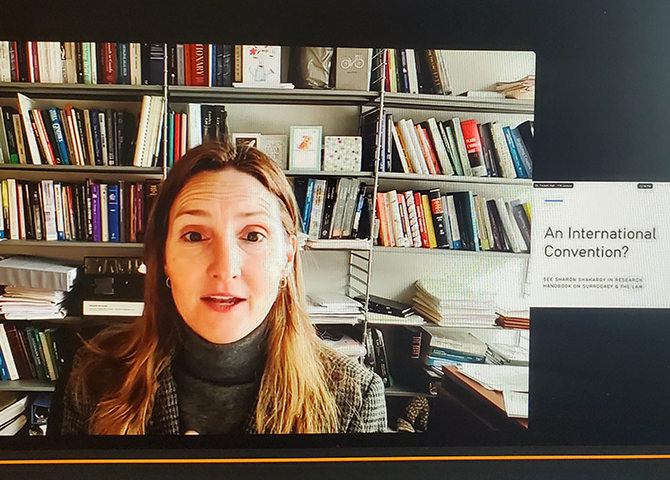
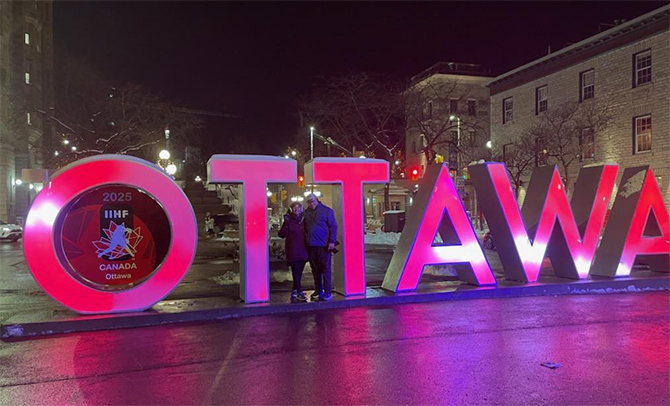
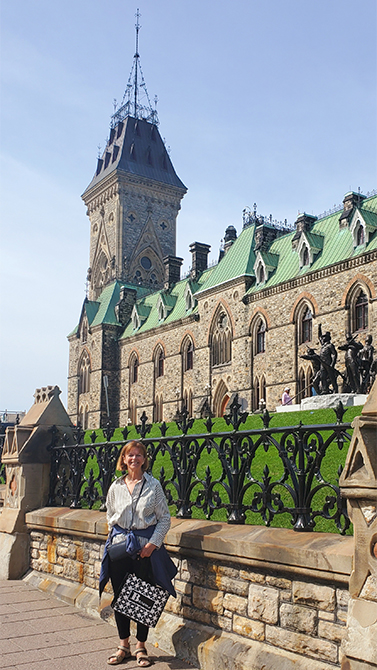
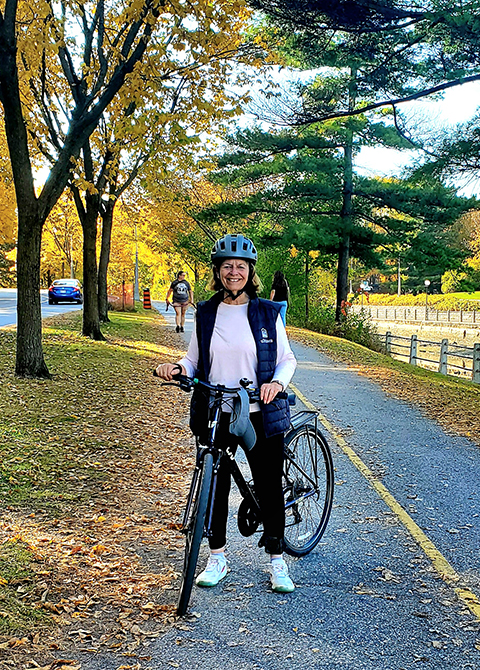
Professor Katherine Pearson has deep experience in the field of elder law. She is the author of articles and book chapters on long-term care, financing issues, and filial obligations. Her most recent publications include two chapters in the Edward Elgar handbook series on Law, Society and Ageing, appearing in August 2024. She is the co-author of The Law of Financial Abuse and Exploitation (Bisel 2011) — a book about protection of vulnerable persons from financial exploitation. In addition to her most recent Fulbright position in Canada, she is a former Fulbright Scholar (U.K., Queens University Belfast, 2010). Professor Pearson’s work includes international, comparative analysis of laws and policies affecting older persons, and she has served as an international research consultant with teams in the U.K. and Northern Ireland to promote better systems for safeguarding and adult social care
Professor Pearson has served in leadership positions on national and state organizations for academics and attorneys specializing in elder law, including the National Academy of Elder Law Attorneys, the AALS Section on Law and Aging, and the Pennsylvania Bar Association Elder Law Section. She was a member of the Pennsylvania Supreme Court Elder Law Task Force that issued an influential report. For more than ten years, she served as director of Penn State’s Elder Protection Clinic.